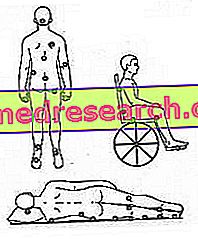Definition
Hyperreflexia is an exaggerated accentuation of deep or muscle-tendon reflexes (as a rule, these are minimal in the healthy subject).
This sign generally indicates the presence of a lesion of the corticospinal tract, that is of the nerve pathways that from the higher centers are directed to the spinal cord.
The reflexes appear excessive as the control action exerted by the nerve centers located at the level of the brain stem, the cerebellum and the cortex (from which the inhibitory stimuli come) on the spinal ones is missing. Sometimes, hyperreflexia can be the cause of a multiple response that can give rise to the clonus, or a rapid and rhythmic succession of muscular contractions and decontractions.
Hyperreflexia is observed in infantile cerebral paralysis, in acute or advanced compression of the spinal cord and in acute and severe damage (eg ischemia or traumatic injury) of the corticospinal tract, responsible for damage to the upper motor neurons.
Other neurological causes may include multisystem atrophy, amyotrophic lateral sclerosis (ALS) and radiculopathies.
When it derives from a superior neuro-motor disorder or from a lesion of the corticospinal tract, hyperreflexia is generally associated with other symptoms that indicate an involvement of the pyramidal system.
An exaggerated accentuation of reflexes can appear, in fact, in other conditions, such as states of anxiety and hyperexcitation. Hyperreflexia can also be seen in the presence of endocrine, metabolic and toxic alterations, such as hyperthyroidism, hypoglycemia, anoxia, heavy metal poisoning, porto-systemic encephalopathy, hyperparathyroidism, pheochromocytoma , neurosyphilis and renal failure.
Furthermore, hyperreflexia can be induced by the use of particular substances and drugs (eg serotonin syndrome, amphetamine intake, ketamine and phencyclidine intoxication, benzodiazepine withdrawal and alcohol abuse).

Possible Causes * of Hyperreflexia
- Alcoholism
- Anxiety
- Pheochromocytoma
- Kidney failure
- Hyperparathyroidism
- Hyperthyroidism
- Cerebral ischemia
- Infant Cerebral Palsy
- Spastic paraparesis
- radiculopathy
- Amyotrophic lateral sclerosis
- Syphilis
- Serotonin syndrome
- Cervical spondylosis



